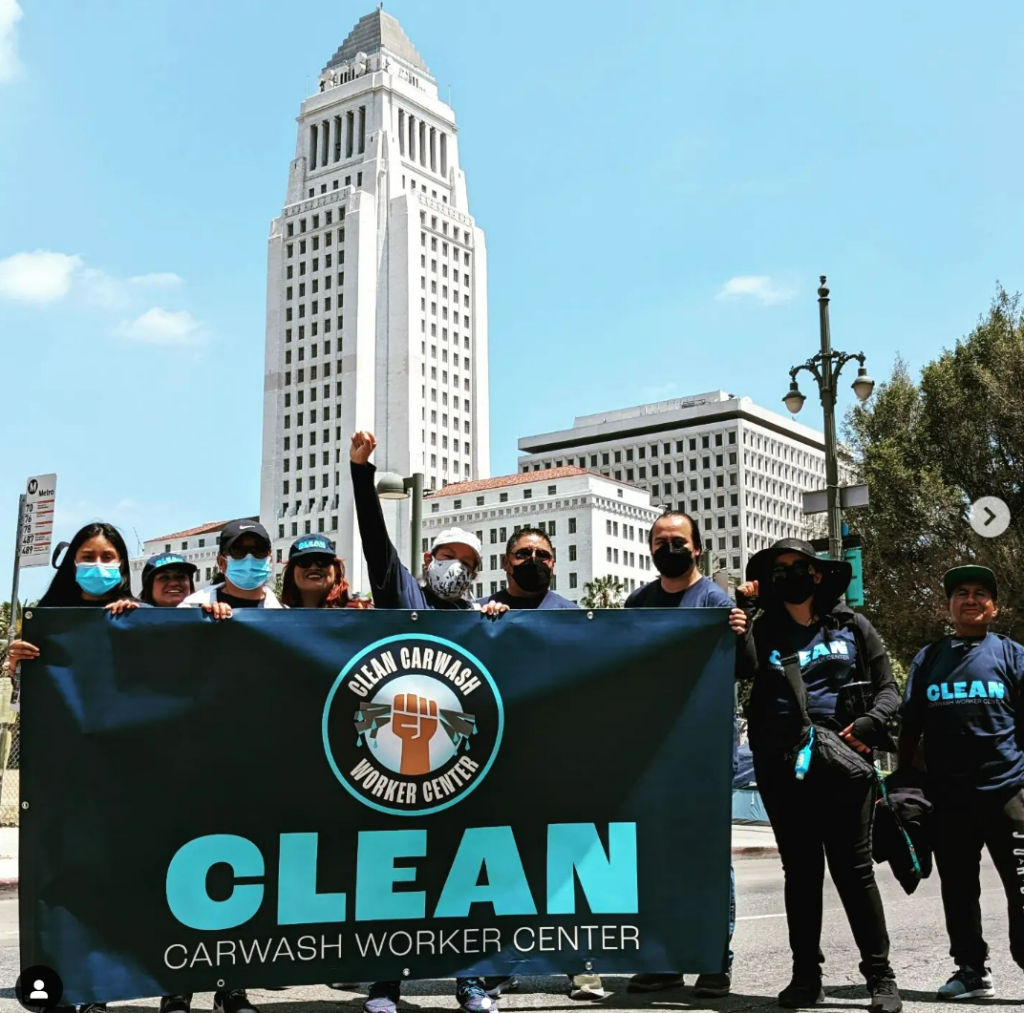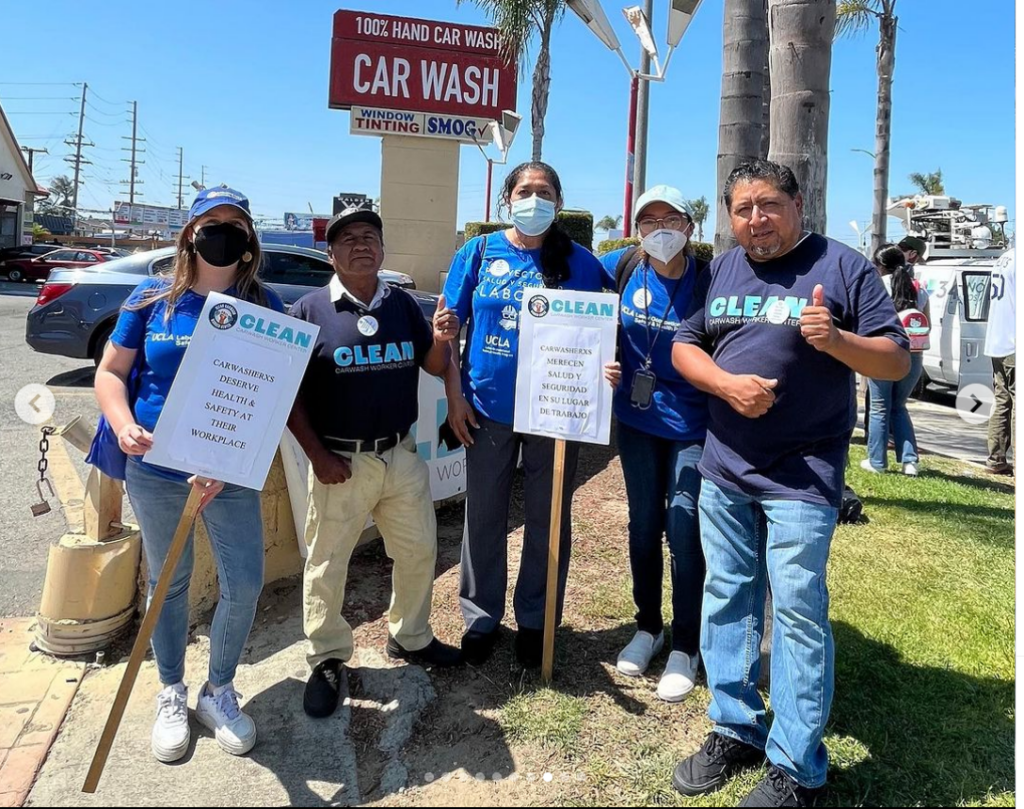Have you ever thought about those people who keep your car clean and shiny? Did you know they are some of the most vulnerable workers in California?
There are over 10,000 carwash workers in Los Angeles, working at over 2,500 carwash businesses in the state. Still, according to CLEAN Carwash Worker Center, only 600 of them are registered, which means this small fraction is most likely to comply with the laws that provide fair wages and other protection to their workers.
“That’s why we exist,” said Flor Rodriguez, Executive Director at CLEAN Carwash Worker Center. CLEAN is the country’s first carwash worker center dedicated to improving the lives of thousands of car washers in L.A.
The center serves 1,800 members and up to 5,000 non-member workers who attend events where they get connected to resources and services.
“Our mission is to create change in the lives of workers in the carwash industry, whether it’s at their workplace and even having a more holistic approach into their everyday lives.”
For the first time, CLEAN was awarded funding by United Way of Greater Los Angeles through its 2022-2023 Community Care and Power funding opportunity, which sparked a new neighborhood-level effort at UWGLA. The goal is to ensure every neighborhood has the systems, spaces, and resources to create solutions to the crisis and build shared prosperity.
With the support of these funds, CLEAN decided to establish the Carwash Worker Solidarity Fund in January 2023 because carwash workers were not only significantly affected by the pandemic, but their jobs were largely affected by climate change. The unusual ongoing storms and rainy and cloudy weather occurring in Los Angeles County have caused a tremendous decline in carwash clientele this year.
“We decided to split this grant in half and use half of those funds to help 53 different families with rental assistance and 22 families with food assistance,” Rodriguez said. “It also helped us to have that holistic approach like our community not only needs rental assistance or food assistance, but they also need health care preventive services, mental health services, which is not common for our Latinx community to be open about it, but we know they need those services.”
The grant helped CLEAN to host their first Annual Car Washers Wellness Resource Fair.
Rodriguez also shared that CLEAN not only provides their members with rental assistance but connects them with the Eviction Defense Network so they can teach them about their rights as tenants. They also learn at the center how to speak up when they get fired in retaliation for demanding their rights.
For instance, CLEAN members organized and rallied around the passage of SB 497- Equal Pay & Anti-Retaliation Act that Governor Newsom signed last month to make it into law.
“They’re already living paycheck to paycheck and work in a very disadvantaged industry; the majority are undocumented immigrants whose language is not English, so they need a lot of support to advocate for themselves,” Rodriguez noted. “We made sure the stories of retaliation suffered by some of our members were heard because in this industry is not a matter of will they be retaliated, it’s a matter of when. They were trying to improve their conditions at work, and I called that a big victory for them.”

Despite the many challenges carwash workers must face in this industry, some of them have learned at CLEAN they can advance in their jobs and even become business owners.
In 2022 CLEAN was also a recipient of the Hartman Family’s Fund for New Leadership, which helped incubate the development of CleanWash Mobile, LLC, the country’s first eco-friendly, worked-owned mobile car washing business. This is a co-op of six members who became co-owners of this innovative car wash business.
“We have leveraged our connections as a worker center to connect them, to get some fleet vehicle contracts, so now they wash the vehicles of St. John’s Medical Clinic, Rodriguez shared. “What gets me really excited is that the workers who own this CleanWash Mobile are not looking only for themselves, but they’re looking to grow in the ownership, and they’re looking to hire, become a place where they can hire workers that get fair wages.”
Rodriguez said the six workers divided their time between the cooperative and working at other car washes. Still, they are doing so well that earlier this year, they were able to quit their other jobs and dedicate full-time to CleanWash Mobile.
Rodriguez believes that the fact that they’ve created something that shows their success in organizing, leadership development, and investment in their members has resulted in the passage of SB 497. “The co-op business is really providing stability to workers and their families.”
She said some of them are saying they no longer have to work two or three jobs because one job is paying what they’re supposed to get in compensation.
“Now that they get to spend more time at home it really creates a movement in our ecosystem because now that workers can be engaged with their children in school activities or other activities in which they could never be involved in the past. That’s creating a different human being as that child is growing up, creating a different relationship with their partner because now they’re there. So, it’s just really creating prosperity in their families and in our communities,” Rodriguez said.
You can also contribute to building community wealth in your neighborhood by donating to our prosperity initiatives or volunteering at your local community organizations such as the ones featured in these blogs.
STAY CONNECTED WITH UNITED WAY OF GREATER L.A.
📱Follow Us!
Instagram | Facebook | Twitter | LinkedIn | TikTok | YouTube
